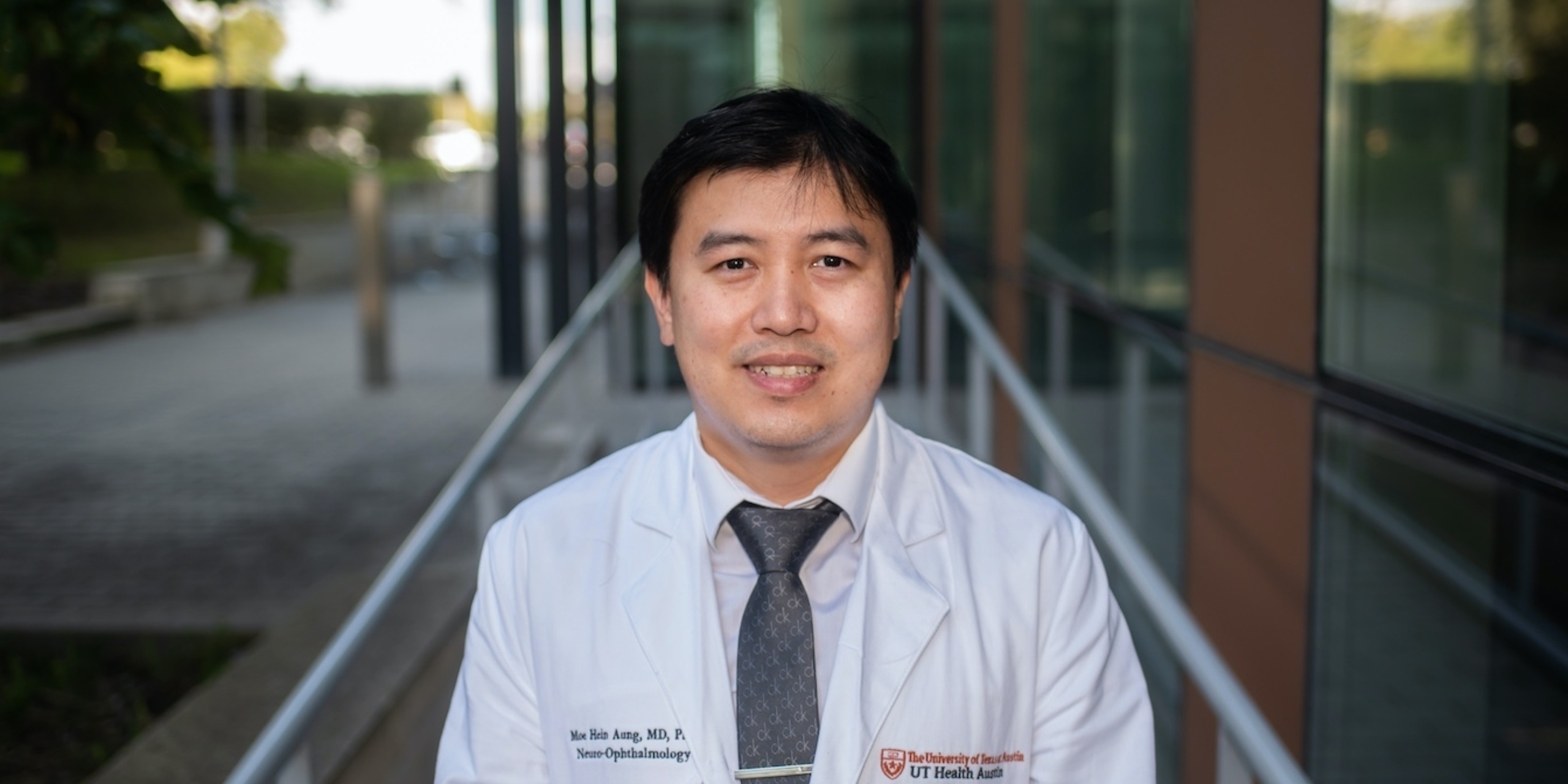What happens when a patient doesn’t receive care quickly enough for an eye disease? For specialists like Harry Aung, M.D., Ph.D., quality eye care is about more than just 20/20 vision; eye health can be closely linked to more systemic diseases of the nervous system. After all, the eyes are an extension of the brain.
Aung, an assistant professor in Dell Medical School’s Department of Ophthalmology, and neuro-ophthalmologist at UT Health Austin’s Mitchel and Shannon Wong Eye Institute, is dedicated to expanding access to critical neuro-ophthalmic care in Central Texas.

Harry Aung, M.D., Ph.D.
What’s the problem you’re hoping to solve, and how did you come to recognize it?
As I was near the end of my training for neuro-ophthalmology — a subspecialty of either neurology or ophthalmology that focuses on neurologic diseases causing visual symptoms — and in the process of planning for the next phase of my career, I was introduced to Jane Edmond, M.D., Wong Family Distinguished University Chair in the Department of Ophthalmology. During our initial meeting, I learned of the critical shortage of available neuro-ophthalmic care in Austin and Central Texas more broadly, which is even more dire for the safety-net populations who face significant barriers to health and eye care.
Coming from Myanmar, formerly known as Burma, I experienced firsthand the effects of a scarcity of quality health care. I’ve seen how it impacted patients who received care at a later stage of their disease after irreversible damage had already occurred. I was immediately captivated by and aligned with Dell Med’s goal to provide the highest quality eye care for patients in Austin, and have been here since the fall of 2021 in pursuit of that goal.
What have been your first steps in improving neuro-ophthalmic care here?
My first goal has been to better introduce neuro-ophthalmology to the Austin medical community and general public. Our team has been at work on general educational initiatives, educating physicians about when their patient should be referred to a neuro-ophthalmologist, and what diseases we diagnose and treat. We have also been expanding our referral network so that patients can be readily referred and evaluated in a timely fashion.
Like Dell Med, the educational aspect of my job is very important to me. Therefore, I was excited to take part in the establishment of the new ophthalmology residency here at Dell Med. I am instructing next-generation physicians on how to provide quality care for neuro-ophthalmic diseases, which will help expand much needed patient care access in the future.
With technological advances in ophthalmic imaging, it has also become relatively quick and easy to take in-depth, high-resolution images of retina and optic nerves — the parts of the eye that receive light and images that are then relayed to the brain. My UT Health Austin colleagues and I are planning to extend our care reach by establishing an ophthalmic diagnostic imaging service. This would allow patients to be referred for ocular imaging, which is not available in their provider’s office, accompanied by our interpretation of the images. This service could be likened to a radiology service for the retina and optic nerves and will help expedite diagnosis and treatment.
What makes you positioned to tackle this problem of eye care access?
Because of my background, I know how limited access to health care can impact one’s life. Receiving quality medical care in Myanmar is a luxury for even the most basic needs, much less specialty care such as ophthalmology. To be evaluated by a doctor, you receive a token at the doctor’s office and wait for hours. When it is finally your turn, you will likely be with physician for no more than a few minutes.
Due to this scarcity of medical care, a physician in Myanmar will see upward of 50-60 patients a day. Often, the patients who are financially capable are forced to travel to nearby countries to receive immediate and top-tier care.
Understanding that similar barriers exist for neuro-ophthalmic care in Texas, I would like Austinites to have access to excellent local ophthalmic services without needing to travel to Houston, Dallas or beyond. Finally, it’s my pleasure and privilege to work with dedicated colleagues and be part of a medical school that is dedicated to expanding access of high-quality care to the citizens of Austin.
This news feature is part of Dell Med’s Voices, a series of profiles that highlight the people of Dell Med as they work to improve health with a unique focus on our community.